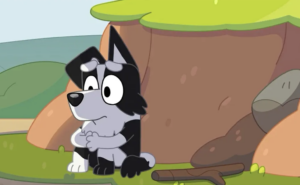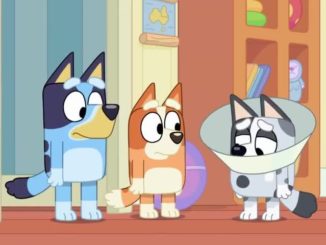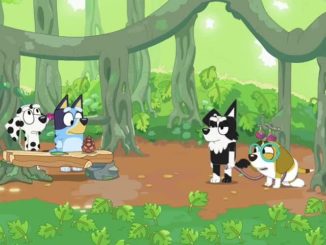There’s an episode of Bluey called Space. In it, three little boys are playing together at their kindergarten. They’re playing pretend space explorers. As they navigate who is going to play what role in the game, one of the little boys keeps asking the other two to pretend that they leave him behind, all alone.
The other little boys aren’t comfortable with playing leaving him behind. They want all the adventurers to stay together, so they keep refusing. Eventually, he climbs through a “black hole” in the pursuit of needing to play out this role of being abandoned. While he’s in the “black hole”, he remembers a time when he was a young toddler and went down a slide at a playground. When he came out, he was all mixed-up about where he landed, and couldn’t find his mother for a moment. He thought he had been left all alone.

The episode shows beautifully (and in a relatively low-stakes way) the way that children use their play to process complex things. He wasn’t doing anything wrong by wanting to play out this feeling of “being left alone”—in fact, his brain was trying to process through what had happened to him when he briefly grappled in real life with a very scary big overwhelming feeling of having been abandoned. Even though he wasn’t really abandoned (his mother quickly calls out to him so he knows where she is), his brain still needed to process through all the feelings that it had brought up in him, because it had introduced the idea to him for the first time that he *could* be left all alone. Meanwhile, the other boys aren’t doing anything wrong, either. They’re trying to play something different and they don’t want their friend to be left out. All of the friends negotiate and figure out how they want to play together and what they want the scope of their play to look like, what needs it’s meeting for each of them. As with almost all Bluey episodes, it’s a gorgeous, poignant love letter to children’s play in all its forms.
My son, Apollo, went through a phase where he had a strange type of play that he kept wanting to return to over and over and over. I could identify many components of the play, but the sum total was unusual and new to me. He loves to squirrel things away in little containers—trinkets, beads, paper scraps, all sorts of little treasures—and carry the containers around with him everywhere he goes. This is a play schema I’m familiar with, the “enclosure” schema. Who doesn’t love to have a little treasure chest full of all their favorite things in easy access at all times?
He began specifically carrying around a bunch of small rocks and pebbles, the shiny semiprecious stones kind you find in a tourist gift shop, like tumbled quartz and such. He would wait for a time when he could specifically play with only me and nobody else involved—usually right before bed—and then he wanted to take them all out and make toy animals touch the rocks and then (as best as I could tell) die, all the while he sort of half-said to me, half-whispered to himself, “They shouldn’t touch those rocks…they touch those rocks…uh oh, they touch those rocks,” etc.
I had no idea what my role was supposed to be in this play. Sometimes he would give me a toy animal. If I made it touch the rock, he would make sure that I also pretended that it died; if I did anything else with the animal he ignored me.
I thought about writing about this at the time, but I didn’t really know where the story went after that. It’s been really interesting to watch the progression, because after about three weeks of wanting to play exclusively “they touch those rocks” with me, for the first time in his life he began to have the word “die” in his vocabulary and begin to play pirate games with swords and such with his sister and other peers. And as best as I can tell, he completely stopped playing “they touch those rocks” (and instead actually picked up a different belief about death—that you can *only* be killed by swords. We’re still working our way through that one. He asked us what the stones were in a cemetery that we routinely walk through on our way to the farmer’s market, and we said “they are to remember people who died,” and he looked over it and shook his head and said “Wow, swords do all that.”)
I don’t get a little animated backstory scene from within his head to explain to me what exactly it was he was thinking and processing through—why he was pretending the rocks were dangerous to touch, what prompted this thing that he needed to think about and work through in his play for awhile before he made sense of it enough to move on. I do know that 5 is a pretty normal age to begin thinking about death in more depth, since 5 year olds sort of start to have an understanding of time and of other larger philosophical things that all sort of tie in to beginning to think about death, and so it made sense that he was right on track with it in his own quirky way.
I also found it interesting that (again, to the best of my knowledge) he would never play this game alone—only when I was sitting in his room with him. If I said it was time for me to go and say goodnight, he would pack up his rocks and put them away. Maybe it helps, when you’re thinking about the vast incomprehensible realities of life and death, to know that someone who loves you is sitting only an arm’s length away.



